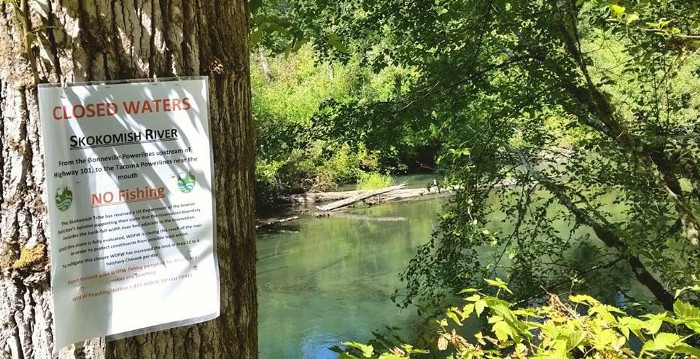
WDFW ‘Not Prepared To Disclaim State Ownership’ Of Lower Skokomish R., Like Tribe Wants
WDFW is “not prepared to disclaim ownership” of the lower end of a Hood Canal river as demanded by tribal officials.
So wrote agency Director Kelly Susewind in a muscular Dec. 1 letter to the Skokomish Tribe after the Tribal Council took the extraordinary step of linking the agency doing so to their agreeing to next year’s salmon seasons with the state.
In his letter to Chairman Charles “Guy” Miller, Susewind termed the council’s midfall resolution that WDFW end it efforts to re-establish state jurisdiction on the Skokomish River not only “a significant departure from co-management,” but said that it would also “violate several court orders and agreements” and contravene the tribe’s “self-regulating” status that requires coordination on fishery issues through the annual North of Falcon process.

Even as Susewind identified offramps, threatened by the Skokomish’s attorney to take the matter to federal court in the overarching U.S. vs. Washington, or Boldt Decision, proceedings, he said that if the tribe doesn’t abide by those binding legal agreements, he agrees that it “should” – emphasis his – go before a judge.
“Furthermore, because we cannot afford to have this issue linger to the point that it clouds the North of Falcon process set to commence early in 2021, I hope we can find a better solution before the end of 2020. If not the matter should be brought to the Court, by either the Tribe or the State, very soon thereafter,” Susewind wrote in the five-page letter.

The state views the river border issue and salmon season agreement as separate matters but the tribal council’s unanimously approved late October resolution bound them together.
The director’s response to that drew praise from angler advocate Frank Urabeck, who has been working for five years to reopen the Skokomish River to sportfishing.
“It’s been a lot of work,” he said in tipping his cap to WDFW special assistant Jim Scott, Mike Grossman at the state Attorney General’s Office, the Kitsap Poggie Club and Ron Garner of Puget Sound Anglers for their efforts.

Susewind’s letter is the latest chapter in a back and forth between WDFW and Skokomish Tribe over ownership of the southeast Olympic Mountains stream, and the second that he’s written.
The issue exploded into view in 2016 with a Department of Interior solicitor general’s opinion that the Skokomish Reservation extended across to the south bank in the river’s 3 1/2 miles just above Hood Canal.
In reaffirming a 1971 regional review, DOI’s Hillary C. Tompkins argued tribal fishers’ weirs “required use and control of the entire width of rivers and their beds,” so an 1855 treaty and a later executive order from President Grant reserved it for the Skokomish Tribe.
That led to the tribe posting no trespassing signs along the south bank and WDFW to close the state fishery, much to the consternation of bank anglers because it is powered by plentiful hatchery Chinook and coho reared at the state’s George Adams Hatchery that are harvested by nontreaty and treaty anglers alike.
Pushed by the fishermen and sportsmen’s clubs, WDFW attempted negotiations with the tribe but when those didn’t go anywhere, a pair of outside historians were hired by the state and they turned up evidence that the boundary was the north bank.
So in October 2019, Susewind wrote to DOI Secretary David Bernhardt that that 2016 opinion was “factually and legally deficient” and asked him to reverse or withdraw it.
And then this October, the Skokomish Tribal Council passed Resolution 2020-144 which terms the state claim of ownership to the river “an affront to our ancestors and … tantamount to an invasion of our territory.”
Further, it directed tribal officials to “oppose the submission of a joint Tribal-State List of Agreed Fisheries until such time as the State of Washington withdraws its false claims of ownership.”
When that document was transmitted to WDFW, it came with this message from the tribe’s attorney:
“Please be advised that the Skokomish Indian Tribe will oppose the submission of a Joint Tribal-State LOAF unless the State withdraws any and all claims to ownership of Skokomish’s River. Absent an act of Congress, the State will find it impossible to open any fisheries commencing in 2021,” according to WDFW.
The LOAF is the List of Agreed Fisheries between the state and Western Washington tribes that sets out the whos, hows and wheres that the harvestable surplus of Chinook, coho and other stocks returning to the region’s rivers will be fished for.
WDFW piggybacks on the tribes’ federal nexus to get faster federal approval to fish over ESA-listed salmon stocks.
Reaching a deal on the LOAF has been tough enough in recent years and state anglers are increasingly chafing at a system that they feel hobbles WDFW in its negotiations with the two dozen or so tribes. The Skokomish resolution exacerbates that argument.
Earlier this fall, a North Sound fishing organization filed a lawsuit in federal court to intervene in Boldt because of sharp cuts to winter Chinook seasons in the San Juan Islands WDFW had to accept this year.
Back on the Skokomish, according to Susewind, the US Supreme Court has ruled that navigable waters were held in reserve for the states as they entered the union and could only be trumped if Congress had specifically said the river was the tribes’s.
“The ownership of navigable waters within Washington State, like the Skokomish River, is an inherent attribute of the State’s sovereignty as well – an interest so deeply engrained in the States’ sovereignty that the drafters of the Washington Constitution affirmed that ownership in Article XVII. This is not an effort to say one government’s concerns are the same or equal to the other government’s concerns. Instead, after listening to the Tribe, we reflect on the fact that both sovereigns have weighty and important interests at stake with regard to the Skokomish River,” he wrote.
The state’s case is also strongly based on an 1874 letter from federal agent Edwin Eells to his boss in Washington, D.C., that stated, “The present reservation lies on the North side of the river extending from the mouth about 3 1/2 miles up the river.”
Susewind referenced it in his letter to DOI’s Bernhardt.
“For all of the reasons reflected in my October 2019 letter, and re-stated here, the Department is not prepared to disclaim the State’s ownership of the Skokomish River,” he wrote to Miller. “At the same time, the Department remains committed to working on co-managed fisheries statewide, and specifically committed to collaborating with the Skokomish Tribe to achieve mutually agreed management of, and fisheries for, salmon originating from the Skokomish River and other Hood Canal areas. However, co-management requires that parties work together in good faith.”

Make no mistake, Director Susewind readily acknowledged the tribe’s long, deep connection to those waters. He said that WDFW’s “interest is in being able to continue opening and managing fisheries within the Skokomish River – fisheries that will always be shared with the Skokomish Tribe because it has a reserved Treaty right to fish there, in common with Washington’s citizens.”
And he recognized the tribe’s concerns that past state seasons along the river’s south bank have been “problematic” and not in accordance to “good environmental stewardship.”
In 2009, the Skokomish expressed justifiable “outrage” after “human waste from sport fishers” led to the closure of shellfishing nearby due to high fecal coliform levels, termed by Chairman Miller a treaty-rights violation.
“We think it is particularly important that the recreational fishery in this area be closed immediately to prevent the problem from getting any worse,” Miller said at the time, adding, “Our people are taught to respect themselves and the environment in which they live. You take care of your needs before and after you go out, and don’t use the riverbank as your bathroom.”
In his December letter to Miller, Susewind wrote that WDFW improved 2014’s and 2015’s salmon fisheries on the Skokomish and added that “we recognize that the recreational fishery must look different in the future.”
Writing to Secretary Bernhardt in early October in support of WDFW, Puget Sound Anglers’ Ron Garner noted that “peer group pressure has been used to address inappropriate behavior by non-responsible anglers as well as action by WDFW enforcement officers.”
August 29, 2009 WDFW press release: Sanitation concerns prompt actions by WDFW on the Skokomish River
September 4, 2009 WDFW press release: Angler involvement key to successful clean-up effort on Skokomish River
Garner also added that the subsequent state closure of the fishery had “resulted in wastage of fish that could otherwise have provided significant public benefits” by being caught in recreational fisheries, north of $14.5 million in foregone economic activity over five years, and decreased support for operations at the state hatchery.
“We thank you for your consideration of our views and trust that you accept our willingness to work with all the parties, especially the Skokomish tribe, to secure a reopening of the Skokomish River recreational fisheries as soon as possible. It is in everyone’s interest for that to happen,” Garner wrote.
Looming overhead in the coming weeks – both the beginning of the 2021 North of Falcon process and change of presidential administrations.
There have been state-tribal sideboards to the reservation boundary question.
In November, the chair and vice chair of the Washington Fish and Wildlife Commission, Larry Carpenter and Barbara Baker, along with WDFW staffers, met with Skokomish leaders to talk about river fishery management issues, but ownership of the stream wasn’t discussed, according to Susewind. He said that Baker was eager to meet Miller in person after Covid-19 and that he and other commissioners would like to as well.
And in the first paragraph of his letter, Susewind noted that the tribe’s legal counsel had “reached out to explore the potential for a negotiation process and, as a result, the Tribal Council may explore this topic on December 2.”
And in the closing one, he said that working through the “rough patches” would work out in the end for WDFW, the tribe and comanaged natural resources.
Between those paragraph was a strong defense about ownership of the river.
